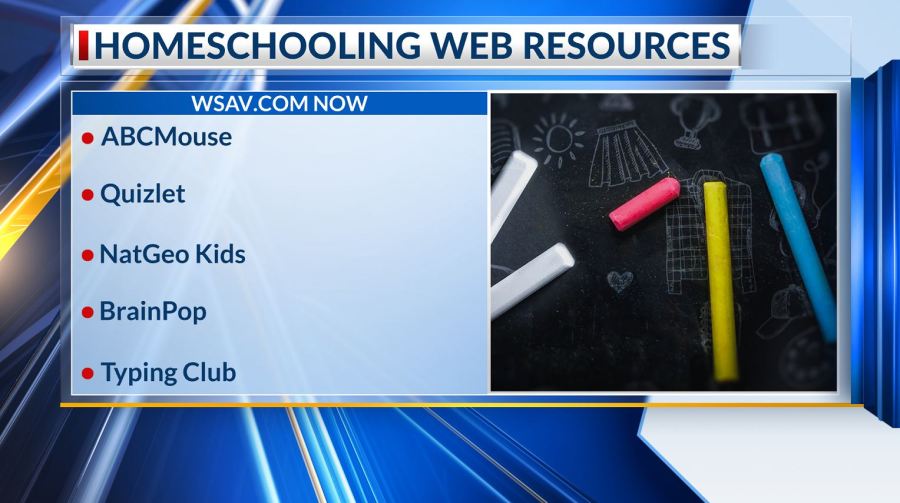SAVANNAH, Ga. (WSAV) — Students who would normally be back in class by now after the end of spring break will be home for a bit longer.
“There’s a lot of stress going on, primarily on how to juggle it all, is what I’m hearing more than anything,” Laurie Beth Keller, a homeschooling mom of three for the past 15 years, said about what her friends with children enrolled in public and private school are saying.
“[They’re] feeling they’ve been thrust into a choice that never crossed their mind prior to a few days ago,” Keller said, adding that her heart goes out to her peers.
“Nobody wants to be forced into situations,” she said. “We here in America kind of like our freedom of making our own choice about education, church, where we work.”
As families adjust, Keller, along with fellow homeschooling parent Chainey Garris, offer advice on how to adjust to this new normal.
Just breathe, and don’t panic
“It’s going to be okay,” said Garris, who has tried public, private and homeschooling for her kids in the past. “Try not to hold yourself to a really high standard.”
Keller says families should take the time to work together on figuring out a plan that works best for them.
“These kids are used to the structure of school, and the family is used to the structure of getting the kids to school, going to work, coming home and doing homework,” she said.
Don’t try to recreate public school at home
“It’s not going to happen,” Garris said. “It’s going to overwhelm you and your kids, and it’s going to make everybody frustrated.”
Keller agrees. “You do not have to suddenly come up with bulletin boards and make your house look like Pinterest or Pottery Barn schoolroom,” she said.
“It’s just going to take time for everyone to find their new groove, whether this is for the rest of this school year, or heaven forbid, falls into next school year, we’re going through change for a while,” Keller added.
The parents also say that a child’s at-home learning schedule doesn’t have to completely mirror what they’re used to at school.
“You’re not going to be able to do an eight-hour school day at home,” Garris warned. “It’s just going to be too much, so try to focus on fundamentals and try not to overwhelm each other.”
Accept that you’re not a trained educator
“I think the best we can do is find a way to embrace what’s going on and make it work to the best of our ability, and not try to mimic what these amazing teachers do out in the public school system,” Keller advised.
“They have so much of my respect and they’re trained to do what they do, but that doesn’t mean we can’t educate our kids, too,” she said, noting that parents with kids at home during the extended break already know their child, but will now have the opportunity to get to know them at a different level and in a different way.
Garris says when she first began homeschooling, she wondered whether she was qualified for the job.
“Just remember that you taught your child how to use the potty, how to tie their shoes, how to write, you teach them how to cook, how to clean, and all of those things came naturally,” Garris said.
“They were daunting at first, but you figured it out, and you’ll do it here, too,” she said.
Set up a dedicated learning area
Homeschooling parents suggest having a space in the home that’s designated for academic learning, if possible.
“We found it effective,” Keller said. “It helps if everybody understands, ‘if you’re in this area, you’re working.’”
She added that if it’s not possible, don’t stress about it. “People have been homeschooling at their kitchen tables since pioneer days,” she said.
Incorporate learning into everyday life
Homeschooling parents say to remember that key subjects in school, including mathematics, reading and science, are used in your family’s everyday activities.
“Things like cooking, for example, can be a lesson in reading (the recipe), following directions is math (‘it says one-fourth but we’re making two boxes, how much do we need?’), and science (heat transfer, chemical reactions),” said Garris.
Count on school systems for guidance
“Right now, until the schools start sending stuff home, don’t go looking for worksheets, I would not go trying to find curriculum at this moment,” Keller said.
She suggests, in the meantime, to do family activities like reading aloud, playing board games, watching age-appropriate documentaries or doing a virtual museum or zoo tours.
“This is a unique opportunity to sit down and play with your kids, love on your kids,” Keller said.
“Don’t stress about addition tables or polymer formations in chemistry this week or even next week,” she added. “A time will come that we may have to find curriculum or implement what the schools are sending home, but for right now, try to figure out a routine, write it down and do your best to follow it.”
Take advantage of online resources
“The good thing is nothing new is getting thrown at them right now; it’s test prep time,” Garris said.
“There’s a lot of good resources online for test prep with USA Test Prep, the I-Ready program that Georgia has, you can access that from home online, Khan Academy is free online, also a lot of different YouTube channels,” she recommended.
Below are a few of Garris’ additional online resource recommendations.










